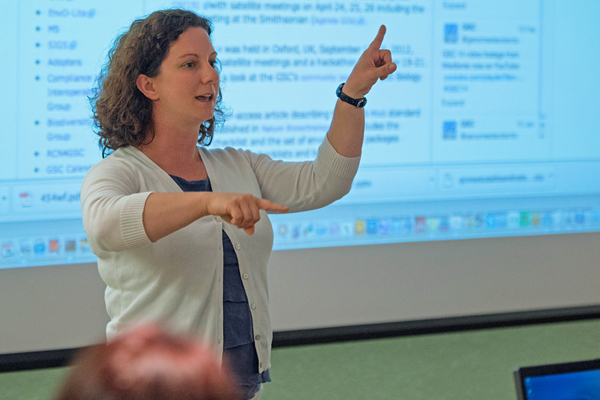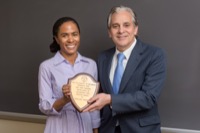
Distinguished lecturer
Marine biologist Biddle awarded lectureship on deep-ocean drilling research
9:48 a.m., Nov. 18, 2013--From drilling rigs in the middle of the ocean, scientists have been digging deep for clues about Earth’s history and life beneath the seafloor for decades. Bringing up slices of oceanic crust has led to discoveries on prehistoric climate, a 65-million-year-old asteroid impact and plate tectonics.
“These are all things that we can get from doing this kind of experimentation,” said Jennifer Biddle, assistant professor of marine biosciences in the University of Delaware’s College of Earth, Ocean, and Environment. “But there’s so much more to know, and I try to leave people with the idea that we’ve only just scratched the surface.”
Honors Stories
National Medal of Science
Warren Award
Biddle has the opportunity to do just that as a 2013-14 Distinguished Lecturer with the U.S. Science Support Program, funded by the National Science Foundation. Lecturers are nominated by their peers in the International Ocean Discovery Program (IODP), which conducts marine geoscience research on drilling platforms around the world.
Biddle is traveling throughout the United States from Florida to Oregon to discuss deep-ocean drilling science and her work on microorganisms living in deep within marine sediment. In total she will visit nine institutions, stopping next at Florida Atlantic University and Harbor Branch Oceanographic Institute from Nov. 19-20.
Her research uses samples obtained through IODP’s drilling program and has appeared in Nature and Proceedings of the National Academy of Sciences, among other journals.
Biddle joined the University’s School of Marine Science and Policy in 2010, having completed a postdoctoral fellowship funded by NASA’s Astrobiology Institute at the University of North Carolina at Chapel Hill earlier that year. She graduated with honors from Rutgers University with a bachelor’s in biotechnology, earned her doctoral degree in biochemistry from Pennsylvania State University and held a postdoctoral position in Penn State’s Department of Geosciences.
Earlier this year Biddle and her colleagues published findings in Nature showing that microbes live 500 feet below the bottom of the ocean, based an innovative genomic analysis of sediment drawn during an IODP mission in 2002. Now she is working on new data coming from more recent expeditions, and she is helping the program decide where future drill sites will be.
The lectureship, which fellow CEOE faculty member Katharina Billups held in 2006-07, raises awareness of deep-sea drilling science. Since 1991, more than 750 presentations have been made through the Distinguished Lecturer Series program to audiences at U.S. colleges, universities and organizations.
Lecture attendees are primarily undergraduates, graduate students and faculty, although some of Biddle’s visits include presentations for high school students, teachers and the general public. Sometimes, audiences are already familiar with deep-sea geobiology, but the interdisciplinary nature of the work — which spans microbiology, geology, genomics and computer science — often interests researchers from various fields.
“I’ve been pretty impressed with the audiences so far,” Biddle said. “They’ve asked good questions.”
For her part, Biddle has enjoyed visiting institutions that might otherwise not be able to afford bringing in guest lecturers from far away, as well as meeting people outside of her usual academic circle. As a young professor, she finds herself both giving career advice to students and receiving tips from more established academics.
“It’s been fun to really talk to people,” Biddle said.
Article by Teresa Messmore








